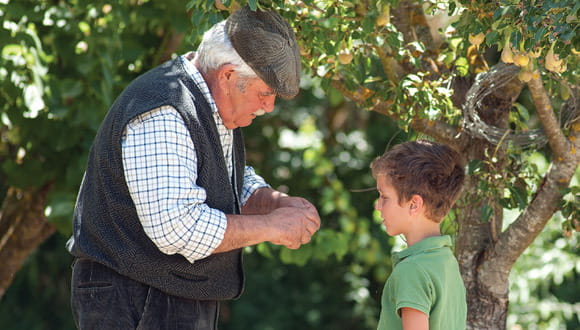9 Reasons People in "Blue Zones" Live Longer, Healthier Lives
Aug. 16, 2022 - Katie McCallumWe all want to live a long, healthy life.
Wouldn't it be great if there was some sort of cheat sheet to help make it happen?
Dan Buettner, a National Geographic explorer, and his team of demographers, scientists and anthropologists might've thought as much when they began studying regions of the world where people live the longest.
The team, which coined the term "Blue Zones," has shared what they learned about the world's longest-lived communities in journal articles, talks and books.
What are Blue Zones?
Blue Zones are areas of the world where people live the longest lives, consistently reaching age 100. In contrast, the average life expectancy in the U.S. is currently 77 years, according to the CDC.
Buettner and his team identified five such Blue Zones.
"And it's not just about longer lives, it's about healthier ones, too," says Caitlin McAfee, a wellness dietitian at Houston Methodist. "People living in Blue Zones are also much less likely to suffer from chronic illnesses."
That's enviable given that 6 in 10 adults in the U.S. have at least one chronic health condition — including diabetes, heart disease, cancer, dementia — and 4 in 10 have two or more conditions.
Where are the Blue Zones?
The five Blue Zones are located in:
- Sardinia, Italy – home to the world's longest-lived men
- Okinawa, Japan – home to the world's longest-lived women
- Loma Linda, California – Seventh-day Adventist community that outlives the average American by a decade
- Ikaria, Greece – tiny island community with significantly reduced rates of common chronic illnesses
- Nicoya, Costa Rica – area where people are more than twice as likely as Americans to reach 90 years of age
"These are the original Blue Zones," says McAfee. "Since this time, though, the Blue Zone principles have been used to create healthier communities across the U.S., including in other parts of California, Oregon, Minnesota and our Texas neighbor, Fort Worth."
What do the Blue Zones teach us about healthy aging?
"The goal of studying the five Blue Zones was to uncover commonalities that might explain why people from these regions live longer lives and without the chronic disease rates we see elsewhere," explains McAfee.
Buettner's team identified nine healthy principles — called the Power 9 — they believe to be at the core of Blue Zone living:
- Making movement a natural part of your day
- Knowing your sense of purpose
- Prioritizing stress relief
- Eating until you're about 80% full
- Eating a largely plant-based diet
- Drinking alcohol in moderation
- Connecting with your community
- Putting family (whether biological or chosen) first
- Choosing social circles that support healthy behaviors
Of course, nine principles is a lot to incorporate right away. Fortunately, McAfee has some advice on how to realistically implement them.
Tips for incorporating Blue Zone principles into your life
"I think movement, eating wisely and stress management are the areas we collectively struggle with the most here in the U.S.," says McAfee.
Indeed, though surveys show the majority of adults want to improve their health habits, more than 90% typically give up on a diet after the first seven months, 70% cancel gym memberships after just two years and more than 30% report experiencing symptoms of anxiety and depression.
When it comes to successfully making lifestyle changes that last, McAfee emphasizes that it's important to start small.
"You don't have to overhaul your life overnight," says McAfee. "Start by incorporating just one or two of these principles, being realistic about what's achievable for you."
For instance, if you know you're not moving enough, McAfee says that you don't have to begin by trying to commit to strenuous exercise five times per week. Instead, your first goal might be walking 15 minutes every day, building up from there.
She also adds that it's important to find your focus and create a plan.
"Pick a principle you want to work on, and then ask yourself what you enjoy doing, what you have access to, when you can make time for it and what's realistic for you," says McAfee. "It's a lot easier to stick with something when you have a foundation set for accomplishing it."
Here are some healthy living ideas to get you started:
- Walk, swim, garden or find some other form of physical activity you enjoy
- Find an activity buddy
- Set reminders to stand up and move every hour
- Increase the amount of vegetables on your plate at each meal
- Try eating plant-based once a week
- Make time for stress relief
- Practice mindfulness and positive self-talk
- Take steps to improve your sleep quality
- Play a brain game
- Disconnect from technology when with family and friends
- Plan dedicated time to spend with your loved ones
- Volunteer in your community
- Join a local group, like a walking club, gardening group or faith-based organization
"If you want to focus on prevention, it starts with making little changes for yourself," McAfee adds. "We've seen communities where these health-promoting behaviors have made a difference, so why not try to adopt a couple and see if they work for you, too?"








